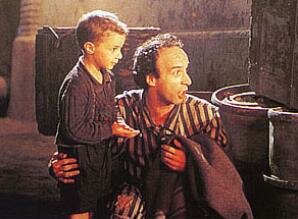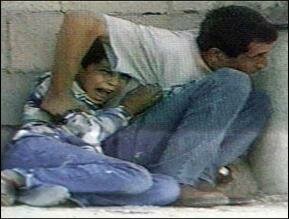

Life is Beautiful
By Mike Odeatlla
A couple of days ago, I woke in the middle of the night to terrible pains in my upper stomach. I had forgotten to take my daily
dose of my medicine and now I had to pay the price. The pains are such that it actually hurts more when I lay down. The only
way to find relief is to stand up and walk. The pains usually go through a stage and last anywhere from 2 to 3 hours and always
occur in the middle of the night.
So there I was pacing back and forth in the family room at 3 o’clock in the morning. I went downstairs because I didn’t want to
waken my wife and children who were sound asleep. While I continued to pace back and forth, trying to seek comfort from the
pain, I turned on the television set. As I flipped through the endless channels and their irritable infomercials, I stumbled across
the late showing of one of my favorite films, Life Is Beautiful. I had seen this very powerful and moving film, which garnered a
few Academy Awards, more than once. I happened to switch on the show at the point in the film where the man and his son
are being transported to the concentration camp. There and then, I stopped my pacing and started to watch the movie, while
standing up, for sitting aggravated my pains.
The movie ended at around 4:30 am and there I was still standing and watching. I was so engrossed in the movie and its
emotional message of life, I had not noticed that my pains had ceased. I was teary eyed as usual by the time the boy was
reunited with his mother in the climatic ending to the movie. The message and story of this magnificently portrayed human drama
never loses its power no matter how many times I have seen it. The story of a man trying to carry on for the sake of his son, in
the midst of the most horrible of conditions imaginable, resonates deeply with me as a Palestinian and more importantly, as a
human being.
The reason that I connect with this film is not because the victims are Jews, BUT because they are human beings. The very act
of a parent trying to shield and spare his child from certain harm and man’s inhumanity, is a universal message that transcends all
ethnic and religious lines whether the setting is in the concentration camps of the Nazis, or the impoverished land of Gaza. There
is sanctity to life in all of its forms. No label must be allowed to dull our senses and make the destruction of life somehow right,
permissible. For far too long we have lived with the labels that paint conflicts as US verses THEM. We attach labels to human
beings to sap their very humanity from them and to facilitate their oppression, abuse, and death. The child becomes something
less when he is perceived as having the opportunity to grow up and become one of THEM. His death is somehow dismissed as
having attained the act of legitimacy. He was not a child, but a future one of THEM. The death of innocents is spun in so many
ways, that after a while, we all become criminals. There are no innocents if one is to believe the spin of both sides. The value of
human life is cheapened. What makes one life more valuable than the next? Don’t we all have dreams and aspirations for our
people and children? The dreams that I have for my children’s future, is not one of pain and suffering. I dream of a peaceful life
and future for my children to realize their full potential as human beings. I did not have children to see them suffer or inflict
suffering on others.
The value and importance of a human life should be not measured by their race and or religion. The humble peasant that is
trying to eek out a living in the wastelands of Afghanistan is just as important as the man who sits in an air conditioned office and
rarely is his hands dirty. They both are working for basically the same thing. That is, they are trying, to the best of their abilities
and resources to provide for their families. They both harbor dreams and ambitions that differ only in their scope and chances
of them attaining them.
In the end, we must realize that life is a sacred and precious thing. Whether one resides in gleaming towers that reach for the
heavens, in a Kibbutz, or in the teeming poverty of a Palestinian refugee camp, Life is indeed BEAUTIFUL.
Mike Odetalla.
11-15-02
By Mike Odeatlla
A couple of days ago, I woke in the middle of the night to terrible pains in my upper stomach. I had forgotten to take my daily
dose of my medicine and now I had to pay the price. The pains are such that it actually hurts more when I lay down. The only
way to find relief is to stand up and walk. The pains usually go through a stage and last anywhere from 2 to 3 hours and always
occur in the middle of the night.
So there I was pacing back and forth in the family room at 3 o’clock in the morning. I went downstairs because I didn’t want to
waken my wife and children who were sound asleep. While I continued to pace back and forth, trying to seek comfort from the
pain, I turned on the television set. As I flipped through the endless channels and their irritable infomercials, I stumbled across
the late showing of one of my favorite films, Life Is Beautiful. I had seen this very powerful and moving film, which garnered a
few Academy Awards, more than once. I happened to switch on the show at the point in the film where the man and his son
are being transported to the concentration camp. There and then, I stopped my pacing and started to watch the movie, while
standing up, for sitting aggravated my pains.
The movie ended at around 4:30 am and there I was still standing and watching. I was so engrossed in the movie and its
emotional message of life, I had not noticed that my pains had ceased. I was teary eyed as usual by the time the boy was
reunited with his mother in the climatic ending to the movie. The message and story of this magnificently portrayed human drama
never loses its power no matter how many times I have seen it. The story of a man trying to carry on for the sake of his son, in
the midst of the most horrible of conditions imaginable, resonates deeply with me as a Palestinian and more importantly, as a
human being.
The reason that I connect with this film is not because the victims are Jews, BUT because they are human beings. The very act
of a parent trying to shield and spare his child from certain harm and man’s inhumanity, is a universal message that transcends all
ethnic and religious lines whether the setting is in the concentration camps of the Nazis, or the impoverished land of Gaza. There
is sanctity to life in all of its forms. No label must be allowed to dull our senses and make the destruction of life somehow right,
permissible. For far too long we have lived with the labels that paint conflicts as US verses THEM. We attach labels to human
beings to sap their very humanity from them and to facilitate their oppression, abuse, and death. The child becomes something
less when he is perceived as having the opportunity to grow up and become one of THEM. His death is somehow dismissed as
having attained the act of legitimacy. He was not a child, but a future one of THEM. The death of innocents is spun in so many
ways, that after a while, we all become criminals. There are no innocents if one is to believe the spin of both sides. The value of
human life is cheapened. What makes one life more valuable than the next? Don’t we all have dreams and aspirations for our
people and children? The dreams that I have for my children’s future, is not one of pain and suffering. I dream of a peaceful life
and future for my children to realize their full potential as human beings. I did not have children to see them suffer or inflict
suffering on others.
The value and importance of a human life should be not measured by their race and or religion. The humble peasant that is
trying to eek out a living in the wastelands of Afghanistan is just as important as the man who sits in an air conditioned office and
rarely is his hands dirty. They both are working for basically the same thing. That is, they are trying, to the best of their abilities
and resources to provide for their families. They both harbor dreams and ambitions that differ only in their scope and chances
of them attaining them.
In the end, we must realize that life is a sacred and precious thing. Whether one resides in gleaming towers that reach for the
heavens, in a Kibbutz, or in the teeming poverty of a Palestinian refugee camp, Life is indeed BEAUTIFUL.
Mike Odetalla.
11-15-02